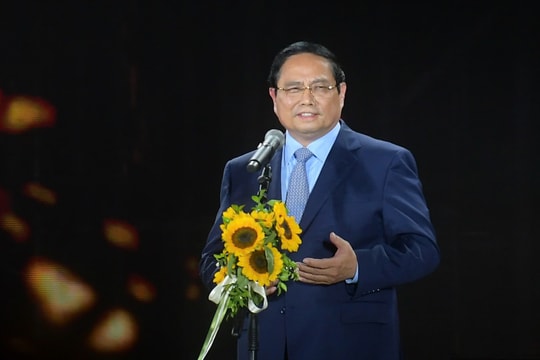New general education program: Each student only needs to choose 5 subjects
In order to ensure students have access to careers and prepare for quality post-secondary education, the new general education program will have many changes, especially at the high school level, in the direction that students will study fewer subjects but focus on career orientation.
 |
| Illustration photo. |
Professor Nguyen Minh Thuyet, Editor-in-Chief of the new general education program, when talking with Thanh Nien reporters, gave basic ideas when innovating the new general education program expected to be implemented from the 2018-2019 school year.
Each student only needs to choose 5 subjects.
According to the outline of the new program, in grade 10, students will still study all subjects with career guidance content of each subject clearer than the current program. Except for 3 subjects of math, literature, and foreign language which are taught throughout the school year, the remaining subjects are only arranged in one semester. Physical education will be organized in the form of optional sports clubs. Thus, the number of subjects in each semester of grade 10 is only about 6 or 7 subjects.
After the orientation phase in grade 10, from grade 11 onwards, students need to focus on subjects that prepare them for future careers.
According to the program design team's calculations, each student only needs to choose about 5 subjects. In addition to the subjects needed for future careers, students can choose at least one more subject that suits their strengths and interests. For example, a student planning to pursue a medical career will choose math, chemistry, biology. In addition, they can choose foreign languages, fine arts (drawing, sculpture, fashion...) as subjects that the student loves or has a certain talent for.
According to this solution, for each student, the number of subjects will be reduced by more than half. Students will have the opportunity to study more deeply, have more practice time to prepare for future careers and have the opportunity to develop a number of other abilities.
For grades 11 and 12, the estimated maximum number of hours per subject is 5 periods/week. There are expected to be 3 groups of subjects: a group of 3 periods/week, a group of 4 periods/week and a group of 5 periods/week.
Even within a subject, there can be different branches of development for students to choose from. For example, literature will have Literature 1 to practice reading comprehension skills for presentations, public speaking, writing different types of documents, studying about 3-4 periods/week. Literature 2 is for students who are inclined to choose literature.
The draft new program offers many solutions to ensure autonomy for localities and educational institutions. The program will only stipulate the total duration of each subject in the year, not detailed down to each week as before. Schools have the right to proactively arrange plans suitable to specific conditions.
Community service is a mandatory graduation requirement.
Creative experiential activities are an essential requirement and a highlight of the draft comprehensive general education program.
Creative experiential activities include two types: one type is related to the content of each subject and the other type is interdisciplinary or cross-subject integration. The first type of creative experiential activities is carried out by subject teachers within the prescribed hours for that subject. The second type of creative experiential activities is determined by each school in accordance with local requirements, characteristics and specific conditions of the school.
The new program considers participation in creative experiential activities, including community service activities, a mandatory condition for graduation and recommends that universities and colleges consider it a priority condition for admission.
Respect differences In the new program, the qualities that need to be formed and developed in students include the following 16 words: kindness, tolerance; diligence, thrift; responsibility, discipline; honesty, courage. Among these expected qualities, there are traditional values that have been expanded according to the demands of the times. For example, “tolerance” is not only knowing how to forgive but also knowing how to respect differences; “saving” is not only saving money, personal and family assets but also saving resources for sustainable development; “courage” is not only being brave in fighting but also being brave in perceiving and fighting to protect the right, including the critical thinking that we still want to form in new people. The new program develops in students the capacity for autonomy, cooperation and creativity. |
According to TNO


.jpg)
.jpg)




